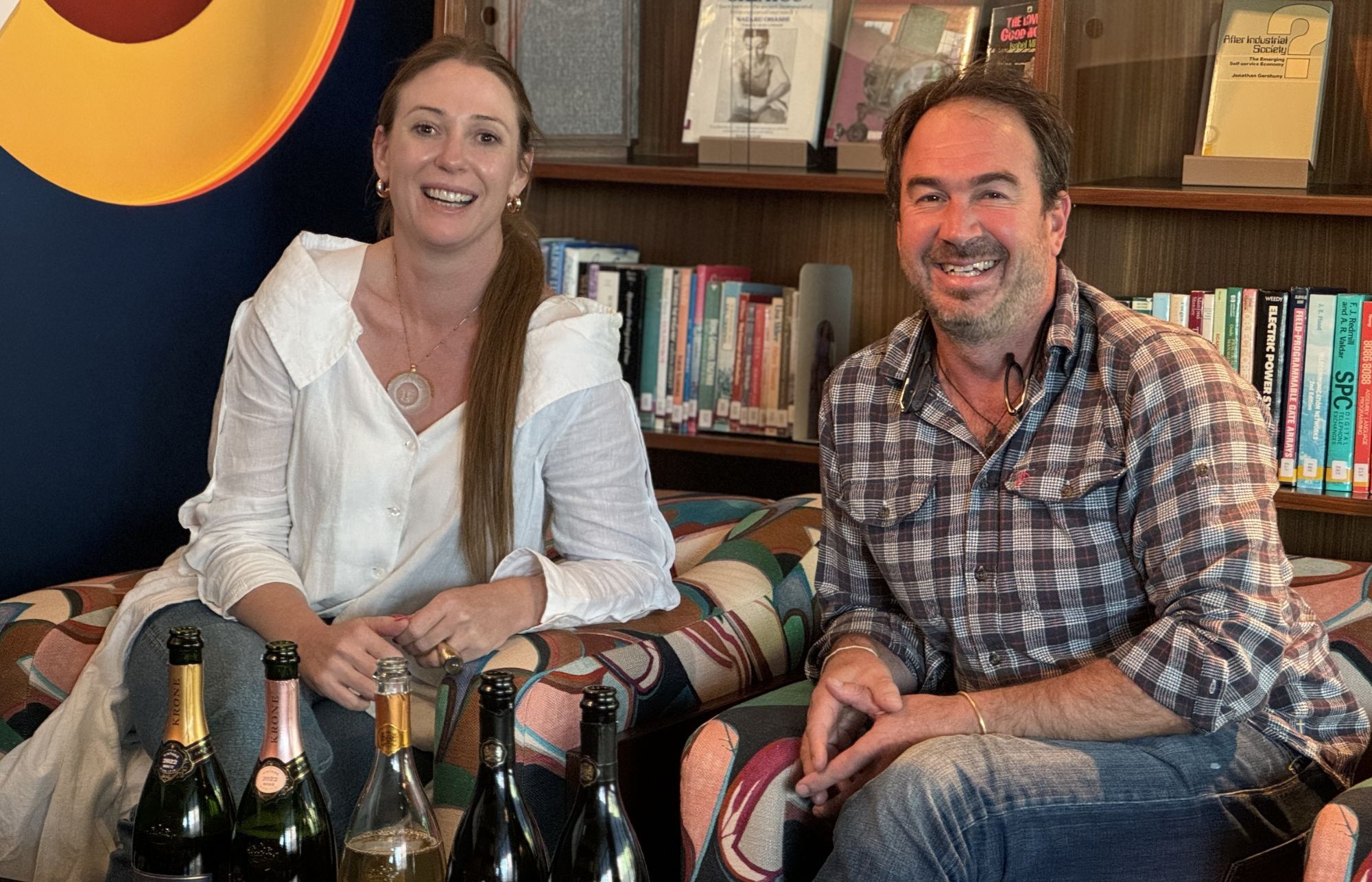I love a bargain. Value for money is my MO. I’m the kind of guy that goes into a supermarket for a loaf of bread and some milk and comes out with a trolley full of yellow labels. Nothing changes when I’m stood in front of wine shelves, so when I first came across Methode Cap Classique wines about a decade or so ago, I felt like I’d been let into this random little secret that the wine trade wanted to keep to itself. These wines were incredible quality for the price you were paying.
I’ve unfortunately never had the pleasure of visiting South Africa so, in order to enjoy these sparkling wines, I’ve been completely at the mercy of UK importers. If you’re like me and you’ve been a fan of bubbles in the UK in the past decade or so, you will have, no doubt, enjoyed a glass or two of Graham Beck. KWV’s Laborie may have also come onto your radar.
Krone Winery, in fairness, might be a new one on many of you. Within its native South Africa, however, they are seen as synonymous with premium level sparkling wines, and a renewed energy to promote these wines to the UK market gave me a wonderful opportunity to find out more in the company of head of sales and marketing, Abigail Rands, and cellar master Rudiger Gretschel.
The story behind Krone Winery
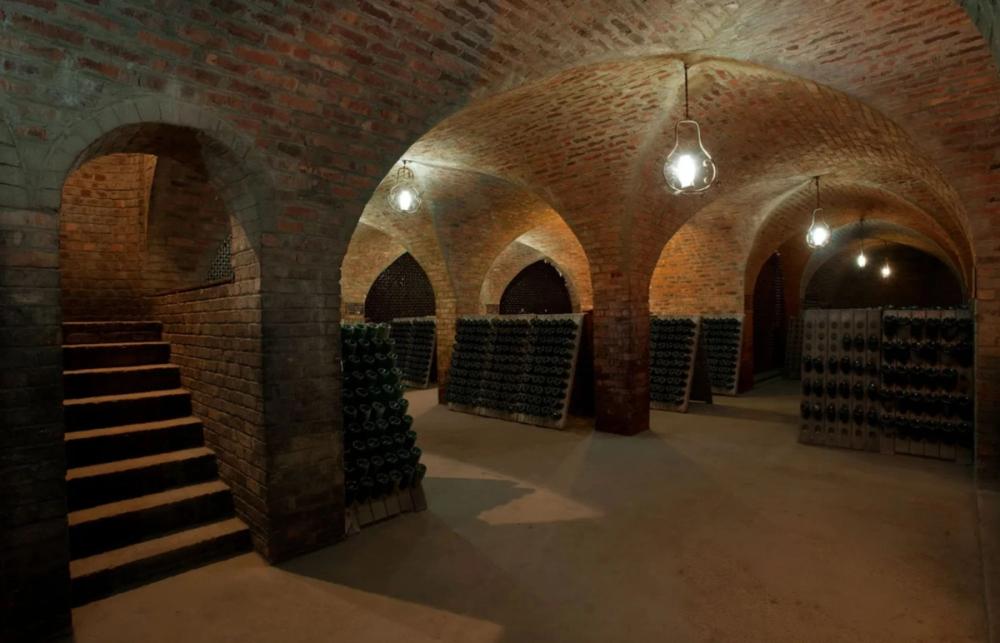
Storage cellars at Krone
The Krone Winery dates back to 1710, making it one of the oldest estates in the Tulbagh Valley, to the north of Paarl in South Africa’s Coastal Region. It is based at the Twee Jonge Gezellen estate, tucked into the northwest corner of the Tulbagh wine region, with vineyards adorning the eastern slopes of the Saronsberg Mountain.
The estate began producing wine in the 20th century and is credited as one of the first wineries to perform cold fermentation in the 1950s. By the 1980s the estate had established itself as experts in the production of traditional method sparkling wines, with the first Krone Borealis (vintage 1987) being released in 1991 to much acclaim.
In 2012, the farm was bought by the Rands family, whose patriarch Tim had started up Vinimark wine distribution company in 1985. The team now consists of Rands family brother and sister duo, Svend and Abigail, as well as renowned Cape winemaker Rudiger Gretschel, also a consultant at Vinimark, as cellar master.
“Krone had been in same family for 300 years,” recalled Gretschel, “but when the family fell on difficulties the estate was placed on auction. I had worked with Abbie’s dad for a while, and we had this crazy idea that this is something we should take on.”
To complete the impressive line-up, Gretschel (who admitted to having “never made bubbles in his life before”) was joined at Krone by Cap Classique specialist and head winemaker Stephan de Beer.
The benefits to bubbles of the Tulbagh Valley
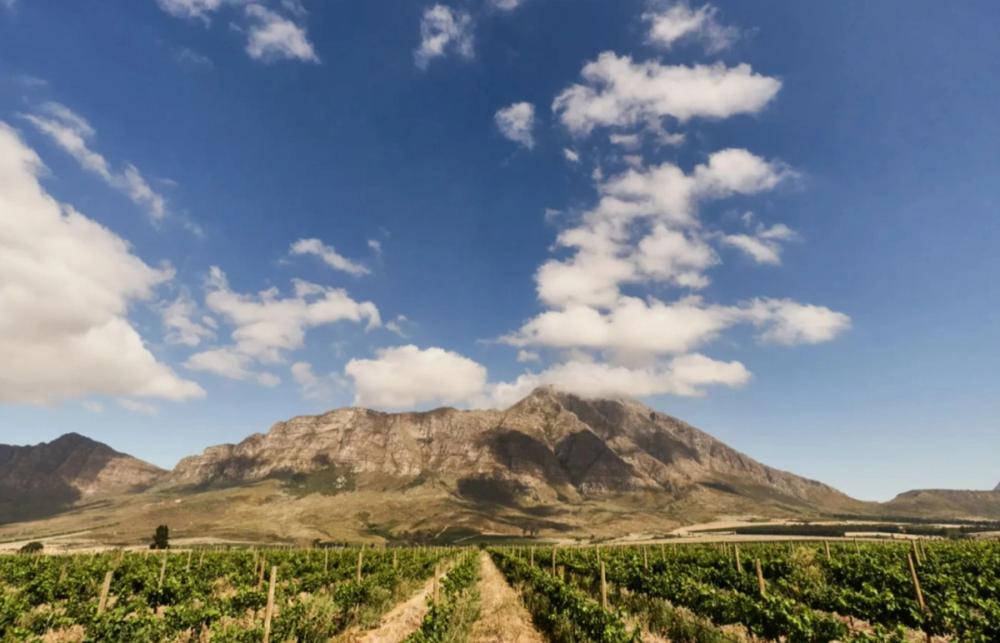
Tulbagh Valley
Although Tulbagh has become famous for its Shiraz wines, the work of wineries like Krone has meant it is also now renowned for its traditional Methode Cap Classique (MCC) sparkling wines.
The Tulbagh valley is sheltered on three sides by mountains (Winterhoek Mountains to the north, Witsenberg Mountains to the east, and the Obiqua mountains to the west), but remains open to cooling winds from the south. These meet warmer, higher winds from the Klein Karoo meaning a constant back and forth of winds and a large diurnal range. These allow the likes of Chardonnay and Pinot Noir to ripen with excellent natural acidity, reinforced by the cooling shadows cast by the domineering mountain ranges. But it’s what’s below the ground that is the real game changer according to the cellar master.
“It’s funny, it’s not a place I’d really considered for top quality bubbles,” admitted Gretschel. “I could never understand why we should grow Pinot Noir and Chardonnay for bubbles in the warmth of Tulbagh?! That is until I explored the soils.”
The valley is where the Greater Karoo tectonic plate meets Greater Coastal tectonic plate, giving rise to a natural, south-facing amphitheatre. The huge amounts of friction when they formed means a large crop of sandstone and rocks, and at elevated altitudes.
“They’re quite surreal plots,” stated Gretschel, “but they mean that grapes ripen earlier with lots of retained malic acid. We usually start harvesting in second week of January, so we miss the January/February heatwaves, and end up with ripe grapes but with the pH of the juice often lower than 3! Such levels of malic acid have enabled us to use malolactic conversion to ensure richness of flavour without losing the fresh acidity. It’s a real signature of what we do here with Krone Cap Classique.”
Creativity at its core
Since its purchase, the ultimate aim has been to restore the Krone winery to its former glories, with a modern design but still inspired by 300 years of history.
Hugely important to the Rands is that the winery is open to the public to see the creative processes in the vineyards and the cellar, as well as the region as a whole. To that end, Abigail Rands was at the forefront of establishing the KRONE x WHATIFTHEWORLD collaborative space offering an immersive experience showcasing African contemporary art in the heart of Tulbagh. The Rands also use the gallery to run an artist residency programme, offering local artists a chance to find inspiration, amongst the vines, barrels and bottles of a working winery and farm.
Although very much getting her hands dirty with the wine production, it’s clear that this additional project means a huge amount to Abigail Rands.
“I regard myself as a designer which is what I studied in Italy,” noted Rands. “I think having artists on site with us adds a creative energy to the farm and forces us to look at ourselves and constantly ask the questions. This process of learning and experimenting allows us to be at the forefront of this new wave of MCC.”
Mind, body, and spirit in the vines
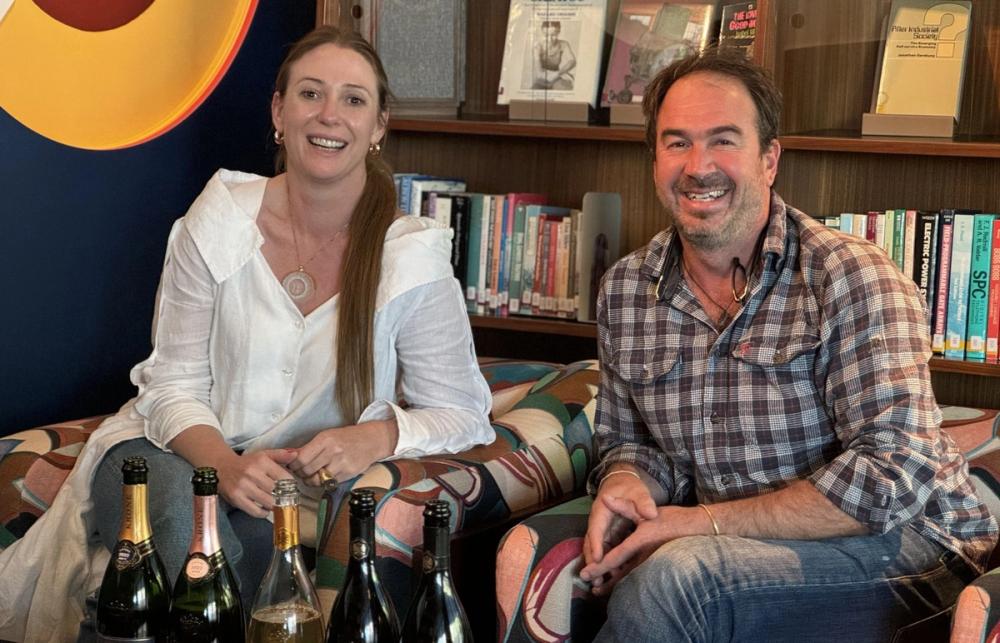
Abigail Rands and Rudiger Gretschel
Krone’s vineyards are looked after by an all-female team. This is something that’s been carefully cultivated in order to combat local social issues.
“Officially South Africa has 32% unemployment,” reported Rands. “Many communities have problems with drugs and alcohol, so it’s no surprise it’s the women that are working. It’s part of the care of our workers to offer them all the help we can.”
Krone pays notably higher than the minimum wage, whilst also offering education in both their lives and work. Social workers that specialise in wine industry workers arrive once a week to help with budgeting, dietary requirements, and one-on-one personal engagement. They also sign up to Rosa Kruger’s wine school which teaches vineyard courses but without the prerequisite of needing to read or write. “They know the vineyards better than anyone,” stated Gretschel, “so it is a big upside for us to empower them to do more.”
And it doesn’t stop there. Yoga sessions every Friday, all by choice of course, have been running for 10 years now and showing great results for both the winery and vineyard workers. “A healthy body and a healthy mind matter,” explained Rands. “There was a massive shift in the general happiness and productivity on the farm.”
Uniquely vintage product
Unlike many traditional method producers that aim for house blends and styles, especially for the entry points to their portfolios, Krone’s MCC wines are all vintage wines.
“We didn’t want to make a house style, with bruised apple and lemon juice and brioche,” remembered Gretschel. “These soils and this climate mean that we can aim for purity of fruit and freshness year in year out, especially with that little touch of salinity in the base juice from the Atlantic breezes. We can celebrate the nuance of each year on these slopes.”
As the team spends more vintages getting to know the site-specific complexities and rocky soils of Tulbagh, it can also experiment with its Chardonnay sites.
“Chardonnay is a great grape for showcasing terroir,” continued Gretschel. “We can also experiment, keeping plot-specific grapes separate and ageing some of the base wine in foudres. We’re also making a zero dosage wine with South Africa’s first minimal intervention MCC.”
The experimentation and push for premium wines has focused the target client base for the export market. Valerie Lewis is the marketing director of New Generation Wines, strategy partners for Krone’s wines in the UK.
“Krone Borealis is placed and selling really well in Majestic stores,” revealed Lewis, “but the rest of the portfolio, including single vineyard and minimal intervention wines are perfect for higher-end restaurants and independent shops with an educated and curious set of clients. The Cap Classique category is now coming of age, sitting in the nice mid-range price bracket for premium bubbles. Krone, as the only specialist Cap Classique producer in South Africa, is the ideal range to place on lists up and down the country.”
How were the Krone Cap Classique wines tasting?
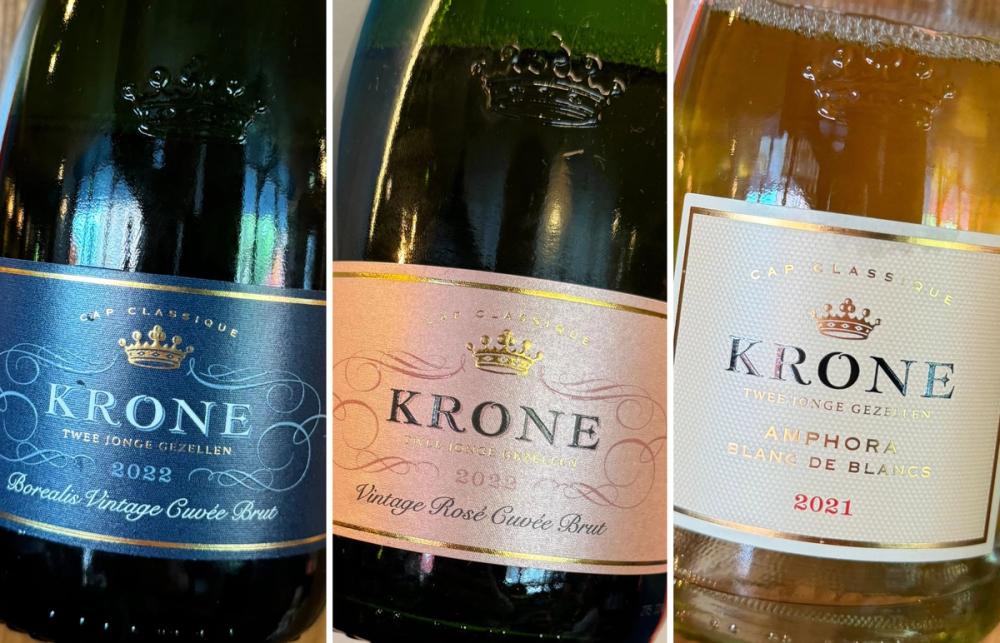
Krone Borealis, Methode Cap Classique, 2022
RRP £17.00, Majestic, nationwide, abv 11.5%
This blend of 80% Chardonnay and 20% Pinot Noir is Krone’s entry point to the portfolio. The fruit is harvested at low temperatures, before stainless steel fermentation. Malolactic conversion is allowed for all wines that aren’t destined for more than three years of autolytic ageing. At a nudge over 18 months of ageing, the base wines for this wine are subject to malo, with the resultant wine packed with fresh apples, pears, lemons, toast, smoke, salinity, and a lovely white peach finish. Excellent value for money.
Krone Rosé Cuvée Brut 2022
RRP £18.00, abv 11.5%
Made from a blend of 67% Pinot Noir and 33% Chardonnay. Gretschel noted that making rosé sparkling was technically harder than he’d anticipated. He’d originally wanted to use saignée for the colour but realised soon that it wasn’t stable enough as the wine aged in the bottle. The team now adds a bit more red wine along with the dosage, also ensuring vibrant fruit. The nose is packed with cranberries, tangerine, blood orange sherbert and redcurrants, but with plenty of that Tulbagh freshness and minerality on the taste.
Krone Amphora Blanc de Blancs 2021, Zero Dosage
RRP £35-£40, abv 13%
A wine that aims for as minimal intervention as possible. The team wanted to avoid using barrique or foudre to avoid losing the chalkiness. Instead, they use Italian amphora of 500 litre in size or some 400 litre which can help to can control the fermentation temperature even better. The wine overwinters in amphora with malolactic conversion happening within natural racking. After that the wine spends 24 months on the lees. The wine is warmer, spicier, with more savoury, bruised apple, waxy texture, a touch of tannic grip, savoury apple and peach fruit on the finish with lemon pith and saline notes, and beautifully mouth-coating. Really cool wine with lots going on, and all for the same price as a house standard Champagne.
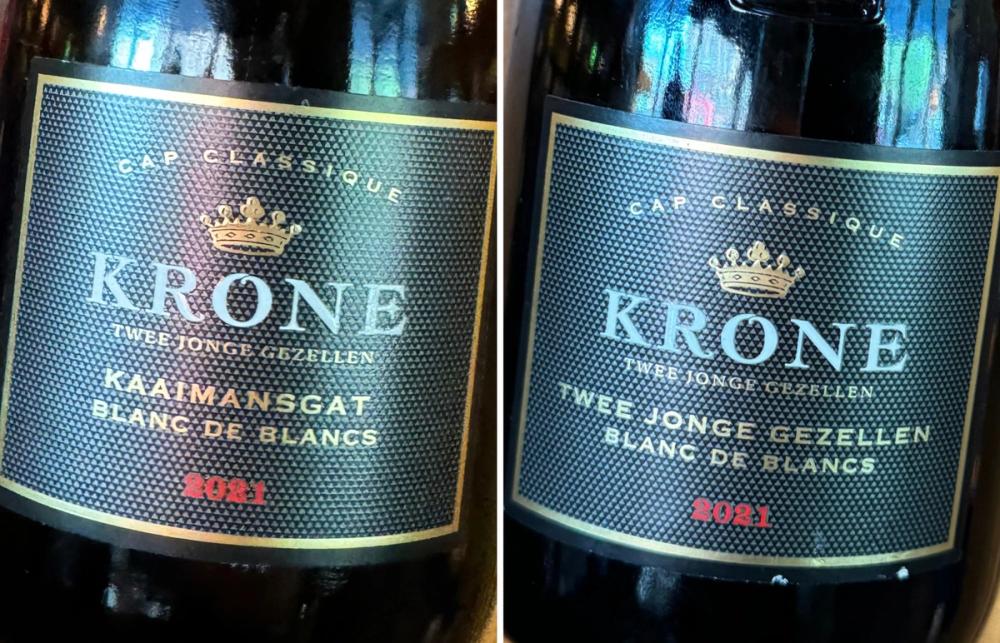
Krone Twee Jonge Gezellen 2021 (Two Young Batchelors) Site-Specific Blanc de Blancs 2021
RRP £35-£40, abv 12%
“We wanted to do something that’s not been done before,” revealed Gretschel. “Chardonnay shows off terroir better than Pinot Noir, so if we wanted to go terroir-specific it was always going to be Blanc de Blancs.” The Twee Jonge Gezellen is the second oldest Chardonnay vineyard in South Africa at 700m altitude. The aim is to get the site to speak, so the team tries not to intervene too much. Whole bunch press followed by natural fermentation in 2500-litre foudre (from Mittelberger in Alto Adige no less!). Left on lees for six months in foudre, the base wine is cooled to inhibit malolactic before secondary ferment in bottle with three years on the lees and a small 5g/l dosage. The wine is very fresh, clean, direct with green and stone fruit, beautifully integrated smoke and cheesecake biscuit. On the finish it’s beautifully coating, with a long, pure fruit finish and lifting salinity. My favourite of the two site-specific BdBs.
Krone Kaaimansgat Site-Specific Blanc de Blancs 2021
RRP £35-£40, abv 12%
100% Chardonnay grown on a beautiful single-vineyard located at 700m above-sea-level. Vibrant and fresh herbal notes, fennel, white peach, apricot, lemons, yellow grapefruit, and a touch of pine resin. Excellent acidity and freshness, but you feel this won’t hit its straps for five years or so. Anyone with the storage space might want to pick up a couple of cases of this one.
For more information on Krone and its portfolio, please contact Valerie Lewis at New Generation Wines on valerie@newgenwines.com
New Generation Wines is a commercial partner of The Buyer. To discover more about them click here.
Mike Turner is a freelance writer, presenter, educator, judge and regular contributor for The Buyer.
